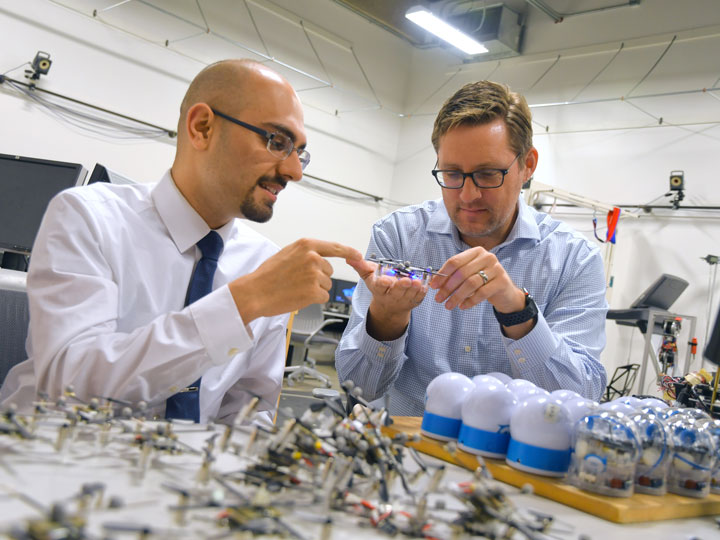
PhD Graduate Plans Next Move, Secures Postdoctoral Fellowship at MIT Aerospace Controls Laboratory

When students begin advanced degree programs, their paths are not always evident at first. Over the course of several years of study and mentorship, they develop a deeper understanding of their fields, clarifying where they will make their own contributions.
Prior to the fall 2018 commencement, Kaveh Fathian MS’13, MS’18, PhD’18 relocated to Boston where he has secured a postdoctoral fellowship at the Massachusetts Institute of Technology (MIT) Aerospace Controls Laboratory, one of the premier control research laboratories in the world. He has spent the last seven years at The University of Texas at Dallas studying how to systematically and precisely control robotic devices, focusing on distributed systems, controls, robotics and computer vision. Nevertheless, if he had been asked what he would be doing today when he began at UT Dallas, he might not have had a direct answer.
“When I began in 2011, I didn’t have a clear vision,” Fathian said. “I have learned that failure is inherent in research and eventually leads to success. It’s good to know others may have the same feelings of simply having too many options to choose from, or not knowing where to go next. Much of what I am working on is an unsolved problem — it’s the nature of research.”
Fathian’s exceptional talents in math and engineering were noted long before he completed his bachelor’s degree in electrical engineering at Imam Khomeini International University in his native country of Iran. He participated in several national mathematics and computer Olympiads and was recognized for academic excellence. However, he needed the guidance of experienced UT Dallas faculty in order to reach his potential.
Dr. Nicholas Gans in particular helped him refine his goals and helped shape his research activities in the Sensing, Robotics, Vision, Controls and Estimation (SeRVICE) laboratory, studying robotics and control theory. Gans, a clinical associate professor of electrical and computer engineering, acted as his primary advisor and doctoral committee chair and mentored Fathian through research projects leading to publication in several peer-reviewed journals.
Fathian focused on two main projects — distributed formation control and camera pose estimation. Distributed formation control involves moving a team of unmanned vehicles to a desired geometric shape while avoiding collision. Camera pose estimation recovers a camera’s motion by using the images that were captured at different locations.
“I’m interested in using visual feedback to allow a team of robots to navigate collaboratively and map an unknown environment,” Fathian wrote. “Images taken by an onboard camera can be used to estimate the robot’s motion, localize it in the environment and measure the relative location of the neighboring robots. Distributed control strategies can use this local information for navigation, where although robots plan their motion individually, their collective behavior leads to the desired objective.”
The research will benefit a variety of applications, including driverless vehicles, autonomous drones and other devices that need efficient ways to prevent collisions or need to function independently in the event GPS signal is lost.

“For the perception problem, we needed to develop a novel algorithm to localize drones from onboard images,” Fathian said. “We have figured out how to drive a team of drones simultaneously even when GPS signal is lost or unavailable.”
Inspired by Gans and other professors including Dr. Mark W. Spong, holder of the Excellence in Education Chair and former dean of the Jonsson School, Fathian decided to pursue an additional master’s degree in mathematics concurrent with his PhD in electrical engineering.
“I looked up to Dr. Spong and others who are both great mathematicians and great engineers,” Fathian said. “At UT Dallas, what I found was my career goal of joining academia as a professor and researcher. I gained the theoretical background, as well as the experiences of teaching and supervising undergraduates.”
Teaching and research in electrical engineering requires an expert level understanding of mathematics. However, Fathian is practical when advising students.
“I encourage students to think about their future profession and develop the necessary skill sets,” Fathian said. “In academia, you need a strong theoretical background. In industry, there is greater emphasis on coding skills and implementation. You have to ask, ‘What’s most important for what I want to do?’”
Fathian’s doctoral dissertation committee as well as the structure of the Jonsson School’s graduate research projects also helped him to refine his path.
“As a faculty member, the greatest satisfaction is having a student exceed my knowledge of a subject, determine the direction of the research, and truly become a leader in their field of study,” Gans said. “Kaveh did this for multiple faculty members in multiple fields. I look forward to working with him as a colleague in the years to come.”
Fathian enjoyed the freedom to take courses from several areas most relevant to his research. “Throughout my PhD program, we have sought to create novel solutions to address control problems,” Fathian said.
At MIT, Fathian plans to continue expanding the study of robotics and applied control theory as a researcher. His postdoctoral fellowship will continue for a year, then he will likely reapply for two or three years before seeking a tenure-track professor role.
“I will use these skills to provide novel solutions to interdisciplinary research problems,” Fathian said. “Integrating methods across disciplines can lead to solutions that are superior to their individual components.”
Though he is now working at one of the world’s most well-recognized institutions, Fathian genuinely enjoyed his time at the Jonsson School and would consider returning.
“After the postdoctoral fellowship is complete, I will see what faculty positions are available,” Fathian said. “This is a long way away, but I would certainly apply at UT Dallas if they had the right opening. I had a great experience here.”
Fathian may not have known exactly where he was going when he began, but now, based upon what he sees in front of him, his career is on track.







